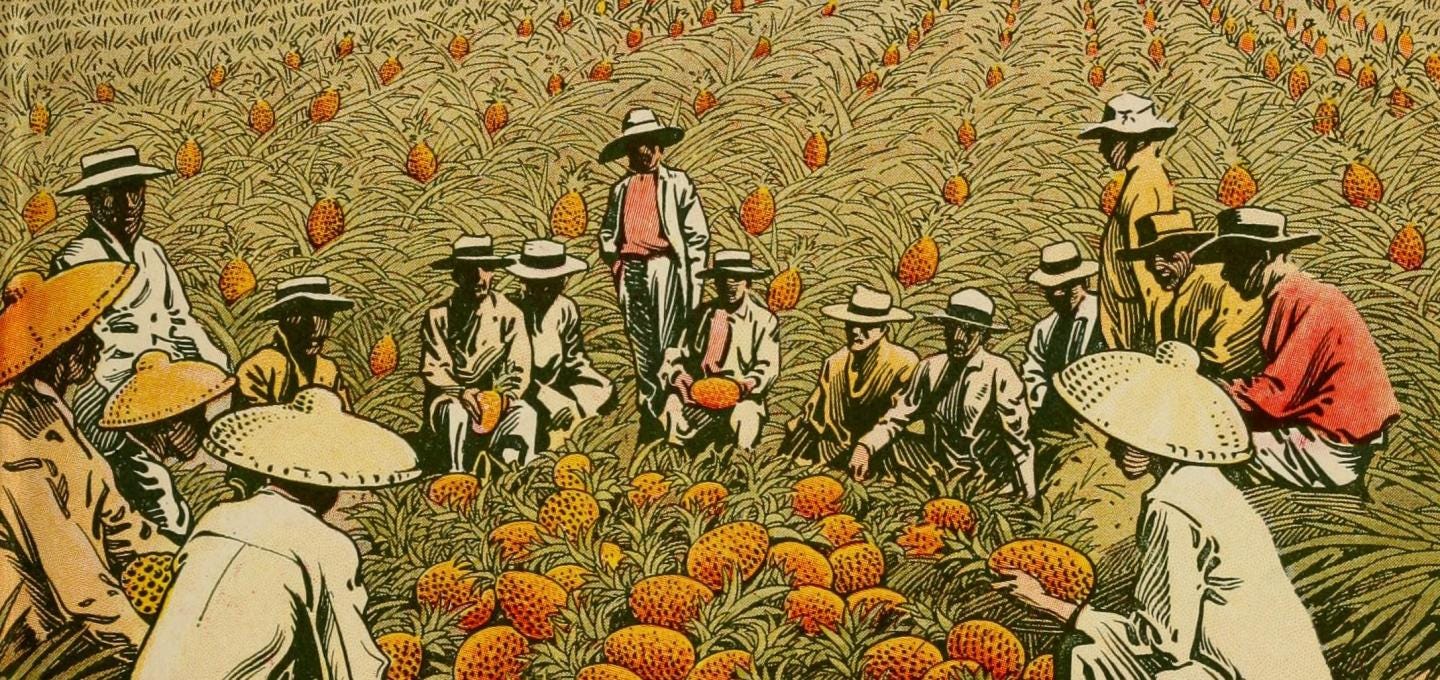Stop associating pineapples with being "Hawaiian"
Issue 181: Changing brand names isn't enough — we have to interrogate the colonial stereotypes imbued in the foodstuffs themselves.
Hello! Welcome to Nosh Box, a lunchtime-ish food newsletter.
Read yesterday’s dispatch: On “the spectacle of life played out in public”
In “Rice as Self,” Emiko Ohnuki-Tierney’s 1993 anthropological history of Japanese national identity, she argues that Japanese imperial leaders deliberately constructed the idea of rice as representative of the Japanese collective identity. She calls rice both a “metaphor and metonym” — both a symbolic representation and an embodied conceptual stand-in for Japan, Japanese people, and the idea of Japanese-ness.
Why am I mentioning this? In today’s culture, pineapples have become both metaphor and metonym for Hawaii. I mean, just think of Hawaiian pizza, which was actually invented by a Greek immigrant in Canada in the 1960s — it certainly isn’t the Canadian bacon that makes it “Hawaiian.” When you eat pineapples, especially Dole brand, you’re made to feel like you’re eating Hawaii, or at least an exoticized tropical fiction of it.
But in this case, pineapple is not representative of the collective “self” Hawaiians themselves imagine. And the imperial nation-building came not from within, as in Japan, but via an oppressive outside colonial power, the U.S. This powerful Twitter thread breaks down why we need to decouple pineapples from Hawaii in the popular imagination:




As I’ve mentioned before, brands like Aunt Jemima, Uncle Ben’s, and Eskimo Pie are now rushing to distance themselves from the stereotypical nature of their names — but those stereotypes were very much intentional. The products were named as such specifically to evoke certain feelings vis a vis particular racial and cultural groups.
But we also have to realize that changing brand names doesn’t address the ways in which foodstuffs themselves have taken on problematic meanings. In the case of pineapples, the colonial connotations have seeped so deeply into our culture that the pineapple-Hawaii connection transcends the Dole brand name.
I bring up the “Rice as Self” example because I think it undergirds this point: That as eaters, we have to go beyond brand names and think critically about the cultural meanings that have been assigned to our food by nationalist or capitalist actors — perhaps without our consent, but certainly with our buy-in. And I think we need to take an active anticolonialist stance in rejecting them.
(h/t Sarah for sharing the original Twitter thread)
Read more on this subject:
At OZY, more history of American imperialism destroying the kingdom of Hawaii:
With the native population dwindling, Hawaii was now seeded with wealthy nonnatives who’d made their homes and plantations on the islands. “Although settled among us, and drawing their wealth from our resources,” wrote Queen Liliuokalani in 1898, “they were alien to us in their customs and ideas respecting government, and desired above all things the extension of their power. …” A group of white soldiers, along with white businessmen like son-of-missionaries Sanford B. Dole (whose cousin would become a pineapple magnate) and mainlander Peter Cushman Jones demanded a new constitution, known as the 1887 Bayonet Constitution, because the king’s choices essentially were: sign or resign.
Edge Effects, a magazine from the Nelson Institute for Environmental Studies at the University of Wisconsin–Madison, takes a look at pineapple production specifically, including interesting analysis of the way the Dole company exoticized and marketed the image of Hawaii to sell pineapples:
By the 1930s, Native Hawaiian people were depicted not only as harvesters of the product, but as part of the product itself, their bodies used to lend a certain authenticity to the fruit. One advertisement declared that Dole pineapple is “Truly Hawaiian,” depicting a muscular and shirtless Native Hawaiian man kneeling and holding a pineapple. Behind him, a Native woman sits with flowers in her hair and a bowl of pineapples in her lap.
Another cool Hawaii pineapple project: This one, using ArcGIS StoryMaps.

An illustration from a 1914 Hawaiian Pineapple Packers’ Association brochure, entitled “How We Serve Hawaiian Canned Pineapple”

In other news, R.I.P. Odwalla smoothies
which are being discontinued by Coca-Cola after 40 years in existence.
For food studies folks, a very cool call for papers on food and imprisonment

Just as a reader, I’ll eagerly await the arrival of this issue when it’s published!
Finally, today in the Department of Chaos:

Yikes, y’all. See you Monday!



